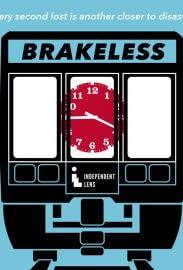
https://www.filmplatform.net/product/brakeless
In April 2005, a commuter train crashed into an apartment building in Japan and killed 107 people when a driver tried to catch up with an 80-second delay. Brakeless looks at a society which does not seem to know when to stop its pursuit of efficiency. It examines the way in which the characteristics conventionally considered to be national virtues – punctuality and loyalty to protocol – have become societal impediments and ultimately, dangers to the people of Japan. The film revisits the train journey and follows the aftermath through the eyes of the survivors.

On Monday April 25th 2005, a West Japan Railway (West JR) commuter train crashed into an apartment building and killed 107 people when a driver tried to catch up with an 80-second delay. Since the accident, the official committee report has concluded that the direct cause of the accident was over-speeding and West JR have agreed to pay compensation for the victims and changed the timetable. However, the fundamental question has remained unanswered – what made the driver risk so many lives for an 80-second delay?
Piecing together personal accounts of those affected by the train crash, Brakeless looks at a society which does not seem to know when to stop its pursuit of efficiency. It examines the way in which the characteristics that are usually considered the national virtues – punctuality and loyalty to protocol – have become societal impediments and ultimately, dangers to the people of Japan.
The film revisits the train journey and follows the aftermath through the eyes of the survivors.
What happened on the day is examined in light of the historical and economic development in post-war Japan. It is a story about modernisation gone too far and a cautionary tale from a country that is cutting corners in all the wrong places in a prolonged economic stagnation. After the privatisation in 1987, West JR shortened the journey time of the route of the accident in order to be faster than its rival railway companies which forced the drivers to reduce the time for braking, stopping and driving. What helped accelerate this process was the cultural attitude which does not recognise that it is part of the human nature to make mistakes. Safety was considered achievable if there is no human error which delayed the investment in safety technology.
The film considers the legacy of the accident through the eye of those whose lives were changed forever. The lasting impact in their lives and the way each deals with their grief poses a question for the wider society that is becoming ever faster. Through the lens of a catastrophic train crash in Japan, Brakeless considers the ultimate cost of efficiency.